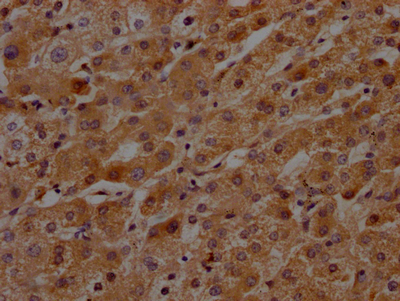The KLKB1 recombinant monoclonal antibody is designed for the detection of human KLKB1 protein in ELISA and IHC applications. This antibody is produced using recombinant DNA technology, whereby the gene coding for the KLKB1 monoclonal antibody is synthesized after sequencing the cDNA of the KLKB1 antibody-producing hybridomas. The hybridomas are generated by fusing B cells isolated from the animal that was immunized with a human KLKB1-derived peptide with myeloma cells. The synthesized gene is then inserted into a vector and transfected into cells for cultivation. Finally, the KLKB1 recombinant monoclonal antibody is purified through affinity chromatography from the cell culture supernatant.
The KLKB1 protein, also known as plasma kallikrein, is an enzyme that plays a role in the blood coagulation system and the kinin-kallikrein system. In the blood coagulation system, KLKB1 cleaves high-molecular-weight kininogen (HK) to produce bradykinin, a vasoactive peptide that regulates blood pressure, smooth muscle contraction, and inflammation. In the kinin-kallikrein system, KLKB1 activates the plasma prekallikrein to kallikrein, which can then cleave HK to produce bradykinin. KLKB1 also activates coagulation factor XII (Hageman factor), which plays a role in the initiation of the intrinsic pathway of blood coagulation. Additionally, KLKB1 has been implicated in the regulation of angiogenesis and tumor growth.






